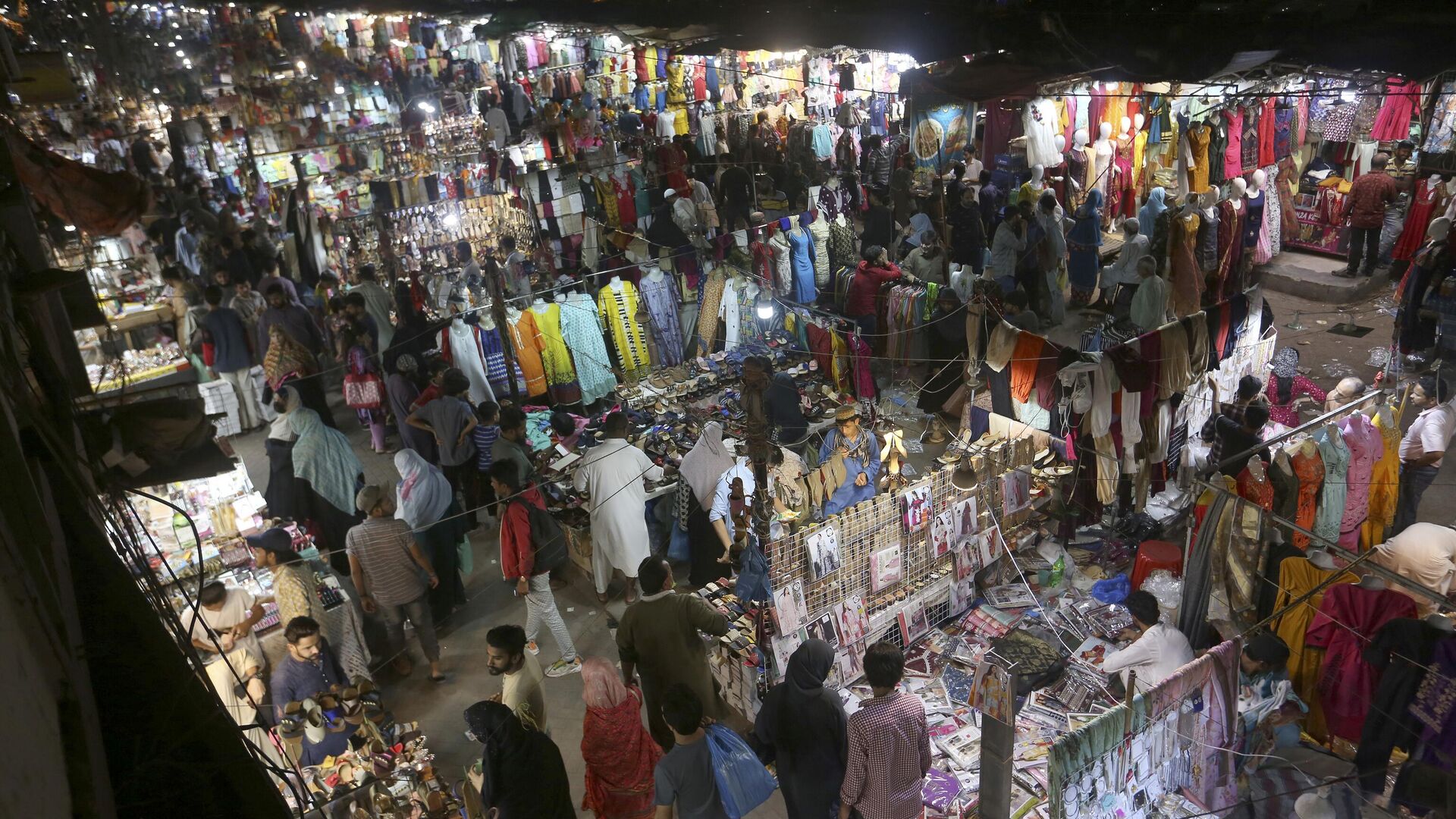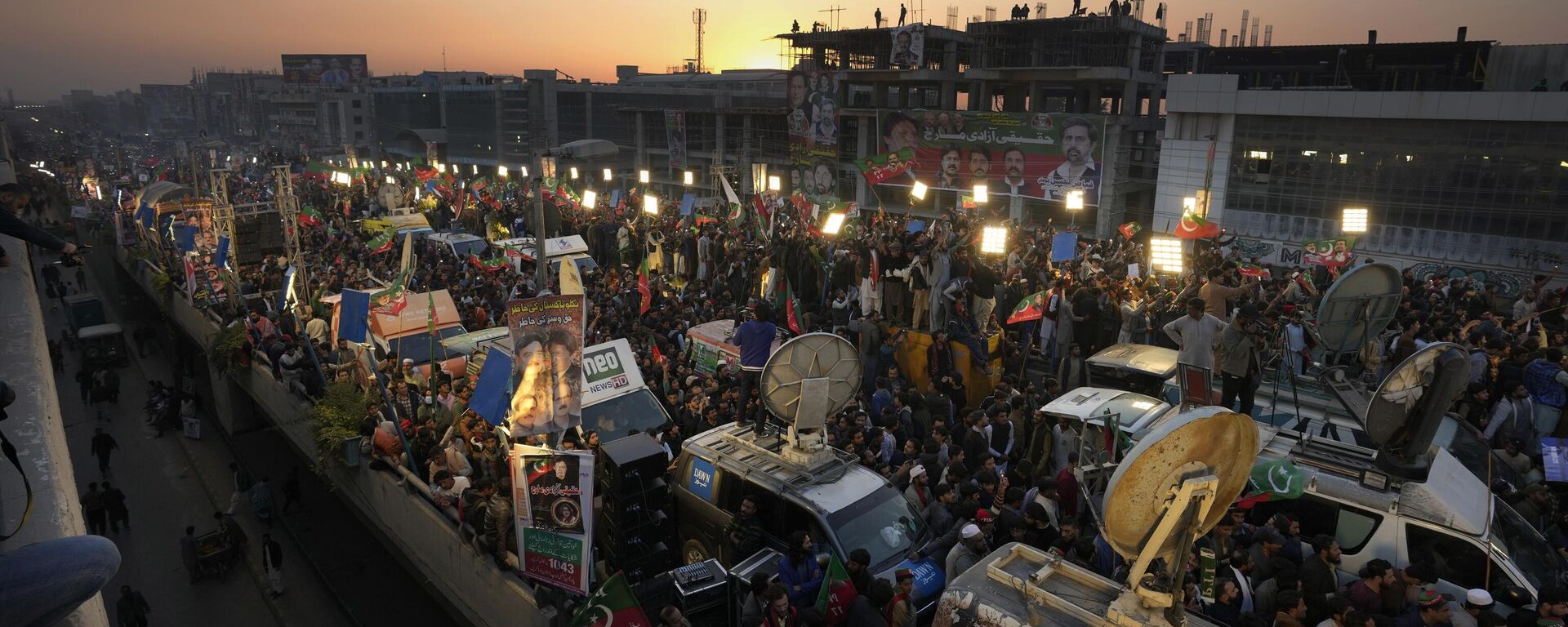https://sputniknews.in/20230103/pakistan-to-shut-markets-malls--marriage-halls-early-amid-crippling-energy-shortage-373079.html
Pakistan to Shut Markets, Malls & Marriage Halls Early Amid Crippling Energy Shortage
Pakistan to Shut Markets, Malls & Marriage Halls Early Amid Crippling Energy Shortage
Sputnik India
Markets and shopping malls across Pakistan will have to close down by 8:30 PM daily, as per a new energy conservation plan approved by the federal cabinet headed by Prime Minister Shehbaz Sharif.
2023-01-03T19:41+0530
2023-01-03T19:41+0530
2023-01-03T19:41+0530
world news
pakistan
south asia
shehbaz sharif
energy crisis
https://cdn1.img.sputniknews.in/img/07e7/01/03/374405_0:160:3073:1888_1920x0_80_0_0_c0c0d56a8ba95b2cf058fcba35c62ae0.jpg
Markets and shopping malls across Pakistan will have to close by 8:30 p.m., as part of a wide-reaching new energy conservation plan.The plan was approved by Prime Minister Shehbaz Sharif's cabinet and will be implemented immediately. Lights were reportedly turned off during the cabinet meeting earlier in the day in a “symbolic gesture."The minister emphasized the need for Pakistanis to implement a change to their “lifestyle” in a bid to conserve energy.He also stated that the government has decided to ban the production of electric-run fans and incandescent light bulbs starting July and February, respectively, as well as increase duties on the import of “inefficient fans”.The government is also reportedly looking to cut down on its own usage of electricity by around 30 percent, with government buildings, including courts, being advised to make use of sunlight.Authorities are also looking to save energy through rationing power going into street lamps and will expedite the introduction of e-bikes on the streets to help save the country significant revenue, noting that the current consumption of crude amounted to $3 billion.Asif underscored that Pakistan consumed around 29,000 Megawatts (MW) of electricity during summer, compared to a nationwide usage of around 12,000 MW in winter months.Pakistan’s Economic CrisisPakistan’s new energy conservation plan comes into effect amid an ongoing shortage of forex reserves, which fell to an eight-year low last month.Most of the current revenues are being spent on paying for imports of gas and crude, amid global volatility in energy prices caused by western efforts to phase out Russian commodities in the wake of the special military operation in Ukraine.To make matters worse, Islamabad has complained that limited market supplies from traditional suppliers in the Middle East are now being lapped up by European countries, who are willing to pay higher prices.A tender floated by Islamabad in August to supply gas for a five-year period found no bidders.Islamabad is currently awaiting billions of dollars of loans and aid packages from the International Monetary Fund (IMF), as well as other countries such as Saudi Arabia and the US, in order to tide over the crisis.
https://sputniknews.in/20221230/imran-khans-party-to-launch-nationwide-protests-against-sinking-economy-318700.html
pakistan
south asia
Sputnik India
feedback.hindi@sputniknews.com
+74956456601
MIA „Rossiya Segodnya“
2023
Dhairya Maheshwari
https://cdn1.img.sputniknews.in/img/07e6/0c/13/138962_0:0:641:640_100x100_80_0_0_2cb44360dbcdf6d84bf4b299cd045917.jpg
Dhairya Maheshwari
https://cdn1.img.sputniknews.in/img/07e6/0c/13/138962_0:0:641:640_100x100_80_0_0_2cb44360dbcdf6d84bf4b299cd045917.jpg
News
en_IN
Sputnik India
feedback.hindi@sputniknews.com
+74956456601
MIA „Rossiya Segodnya“
Sputnik India
feedback.hindi@sputniknews.com
+74956456601
MIA „Rossiya Segodnya“
Dhairya Maheshwari
https://cdn1.img.sputniknews.in/img/07e6/0c/13/138962_0:0:641:640_100x100_80_0_0_2cb44360dbcdf6d84bf4b299cd045917.jpg
pakistan energy crisis 2022, pakistan energy crisis, pakistan energy consumption, pakistan economy, pakistan economic crisis, pakistan default risk
pakistan energy crisis 2022, pakistan energy crisis, pakistan energy consumption, pakistan economy, pakistan economic crisis, pakistan default risk
Pakistan to Shut Markets, Malls & Marriage Halls Early Amid Crippling Energy Shortage
Islamabad claims that the new energy conservation plan will save the economy over $260 million annually.
Markets and shopping malls across Pakistan will have to close by 8:30 p.m., as part of a wide-reaching new energy conservation plan.
The plan was approved by Prime Minister Shehbaz Sharif's cabinet and will be implemented immediately. Lights were reportedly turned off during the cabinet meeting earlier in the day in a “symbolic gesture."
Addressing a press conference after the cabinet meeting on Tuesday, Pakistan’s Defense Minister Khwaja Asif said that all the marriage halls in the country will also have to close by 10 p.m.
The minister emphasized the need for Pakistanis to implement a change to their “lifestyle” in a bid to conserve energy.
He also stated that the government has decided to ban the production of electric-run fans and incandescent light bulbs starting July and February, respectively, as well as increase duties on the import of “inefficient fans”.
The government is also reportedly looking to cut down on its own usage of electricity by around 30 percent, with government buildings, including courts, being advised to make use of sunlight.
Authorities are also looking to save energy through rationing power going into street lamps and will expedite the introduction of e-bikes on the streets to help save the country significant revenue, noting that the current consumption of crude amounted to $3 billion.
Asif underscored that Pakistan consumed around 29,000 Megawatts (MW) of electricity during summer, compared to a nationwide usage of around 12,000 MW in winter months.
Pakistan’s Economic Crisis
Pakistan’s new energy conservation plan comes into effect amid an ongoing shortage of forex reserves, which fell to an eight-year low last month.
Most of the current revenues are being spent on paying for imports of gas and crude, amid global volatility in energy prices caused by western efforts to phase out Russian commodities in the wake of the special military operation in Ukraine.
To make matters worse, Islamabad has complained that
limited market supplies from traditional suppliers in the Middle East are now being lapped up by European countries, who are willing to pay higher prices.
A tender floated by Islamabad in August to supply gas for a five-year period found no bidders.
Islamabad is currently awaiting billions of dollars of loans and aid packages from the International Monetary Fund (IMF), as well as other countries such as Saudi Arabia and the US, in order to tide over the crisis.



